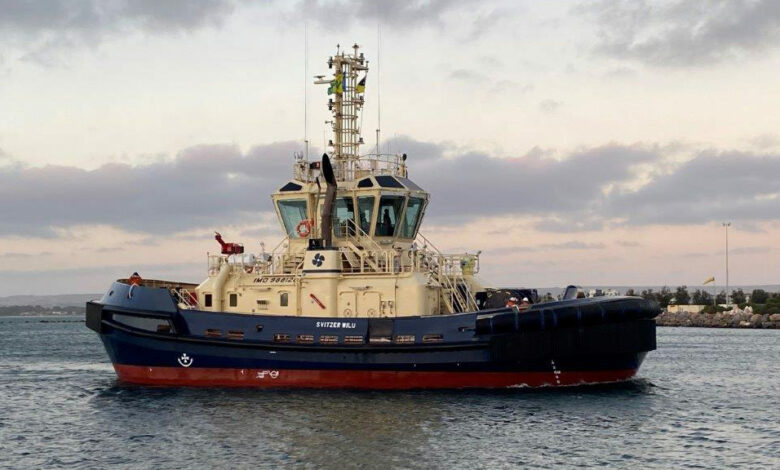Svitzer’s Australian lockout threat branded ‘economic vandalism’

Australia is a day and a half away from seeing many of its most important ports shuttered with frantic discussions ongoing to avert a supply chain crisis brought about by dire relations between sea going staff and the nation’s largest towage operator.
Svitzer’s decision to lockout nearly 600 staff at 17 ports from this Friday was branded today as “economic vandalism” by a minister in the Anthony Albanese-led government.
The towage operator, which has 100 vessels operating in Australian waters, has faced multiple strikes from staff over the past three years as it looks to overhaul its pay structure. With the industrial actions worsening in recent weeks, Svitzer, a unit of Denmark’s AP Moller-Maersk, announced on Monday it would lock out staff belonging to three unions on Friday.
What Svitzer are attempting to do is economic vandalism
Australia’s Fair Work Commission has decided to intervene, holding a brief hearing on Wednesday, listing the hearing before the full bench in Sydney tomorrow. A further hearing will be held on Friday morning if necessary.
The commission will consider whether “the indefinite lockout of employees … is protected industrial action for a proposed enterprise agreement that is threatened, impending or probable”.
The commission said it decided to intervene as the indefinite lockout threat has the potential to “cause significant damage to the Australian economy”.
Australia’s workplace relations minister Tony Burke, speaking at the National Press Club today, commented: “What Svitzer are attempting to do is economic vandalism.”
Burke has urged Svitzer to hold off on locking out its workers until new laws to arbitrate industrial disputes are in place.
Burke said earlier this week that the government’s industrial relations bill would give the Fair Work Commission the power to arbitrate “intractable” disputes, something he hoped would be in place within three weeks.
“They have decided to act now in a way that puts a whole lot of the Australian economy at risk, not simply their own workplace,” Burke said at the National Press Club today, accusing the Danish firm of playing “a game of blackmail with the Australian economy”.
Svitzer’s dominance of the local towage scene – and the fallout from a potential lockout – has led to calls this week for the sector to be nationalised.
“This company’s social licence to operate should now be in doubt, and an inquiry into how a multinational Danish owned company can be allowed to hold an entire country to ransom through this campaign of employer-led industrial militancy must be held so we never again find ourselves vulnerable to this corporate piracy,” said Maritime Union of Australia national secretary Paddy Crumlin.
“While some will view this as momentary – arguing that it will pass in a few days time – the real impact on the Australian economy will reverberate for months,” argued Jonathan Kempe, the CEO of Sydney-based freight and shipment booking marketplace Shipz in conversation with Splash today. “Such chaotic situations can be avoided if the current course of action is rapidly resolved,” Kempe added.

Interesting to read that if union workers go on strike it is acceptable and if an employer does the same it is called “economic vandalism” A quick search resulted in the following information regarding strikes in Australia
“In the June quarter 2022, there were:
52 disputes, 22 more than from the previous quarter.
73,700 employees involved, an increase from 11,400 in the previous quarter.
128,100 working days lost, an increase from 19,600 in the previous quarter.”
https://www.abs.gov.au/statistics/labour/earnings-and-working-conditions/industrial-disputes-australia/latest-release
Bless. Your point being?
The Australian UNIONS are a PEST to the economy of Australia.
It is a CRIMINAL organisation. Wages etc are about double to any other country in the world.
Experienced refusal to sail because no marmalade on board.
Ordered the most expensive food and when questioned the reply was if you do not like it we go on strike.
Australia was the only country in the world where timecharter agreements were signed with the condition
that escalation of hire was subject to any raise of wages or increase of expenses by demands of the crew
at any time. The oilcompany accepted this because stopping the rig would cost more! PURE BLACKMAIL
The company I worked with had 4 offshore vessels under Australian flag working in Australia.
When we decided to leave just because of all these reasons most of the crew begged to stay on and accept
half of the Australian wages. iT IS NOT DIFFICULT TO GUESS TO OUR REPLY!
Flying to the port of embarkation had to be FIRST CLASS and next a FULL resting day in a 5 star hotel before
boarding the vessel.
No argument or try to negotiate or they blackmail the company with a strike.
Any drilling rig offered for an Australian operation will have a 20% increase on the rate to start with to
compensate the ridiculous demands of the unions.
Svitser is now the first one challenging the unions and this was highj time.
In other words Australia should be very happy that a FOREIGN company is now challenging this
criminal organisation causing all these problems with resulting a tremendous increase of expenses
by using blackmail.
What an ill informed, biased rant. All Caps shouty and poor spelling to boot. Pathetic.
Difficult accept the true Mate😉
Try English.
No wonder australian flag vessels are gone down the drain due to stupid demands eith union interfering.